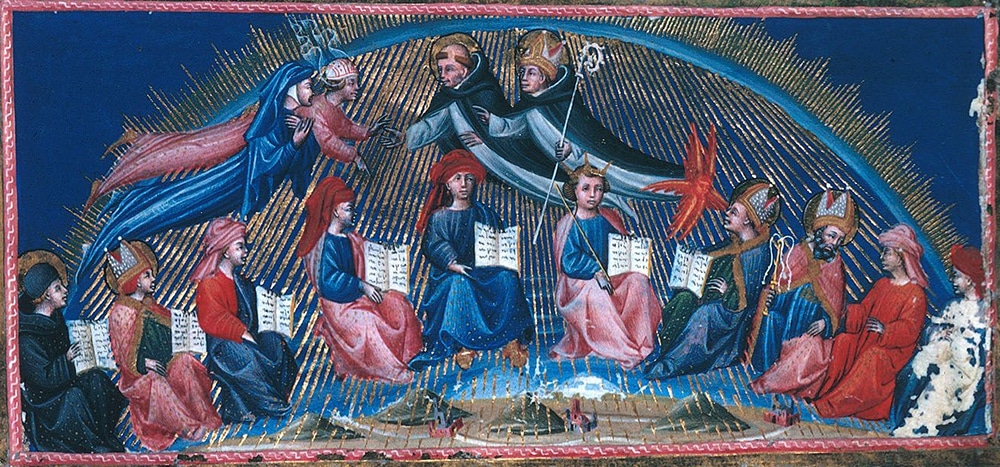This is the final installment of a 10-part series looking at the Ten Commandments.
Blessed are the poor in heart, for they shall see God. But what does it mean to see God? This is worth pondering, especially here at the end of exploring the Ten Commandments.
This question is very appropriate for the final two commandments, because both of them have to do with “coveting”: Thou shall not covet your neighbor’s wife; Thou shall not covet your neighbor’s goods. We might think that each is just a final emphasis on the Sixth and Seventh Commandments, respectively — as if really hammering home the prohibitions on adultery and stealing.
That is not enough, though. Coveting has to do with the way of seeing things; and more so, it has to do with desire, not just in terms of what we desire but also in terms of how we desire.
As it turns out, life in Christ is not just about what we do and don’t do; it is also about how we desire and what we intend. These are matters of the heart.
Imagining the beatific vision
“Seeing God” is another way of speaking about the beatific vision, which the saints enjoy in heavenly bliss. Throughout this series, we have been contemplating the moral and spiritual life in light of the promise and hope of heaven. To think now about what it means to be freed from coveting, we ought to consider what we are freed for in heaven. This concerns how we shall see things in the heavenly kingdom, and for that, we receive guidance from the greatest poet of all-time: Dante.
| Psalm 122:8-9 |
|---|
|
“For the sake of my brothers and friends I say, ‘Peace be with you.’
For the sake of the house of the Lord, our God, I pray for your good.”
|
Even if you know very little about Dante, you surely know that the “Divine Comedy” imagines hell, purgatory and heaven based on Scripture and the Christian tradition. In his third cantica — Paradiso, which imagines heaven — the way things are seen in heaven comes into focus. This revolution in seeing has to do with all sorts of things, like the qualities of light, movement, proportion and beauty. In one intriguing set of episodes, this way of seeing has to do with the way two former rivals see each other anew. They learn to admire and even praise each other.
The two rivals are actually different spiritual families of Christian religious: the Franciscans and the Dominicans. We might not be as impressed by this rivalry as we would be if it were instead Republicans and Democrats, the Red Sox and the Yankees, or country music fans and everyone else. But the rivalry between the Franciscans and Dominicans was strong and charged in a way that others’ aren’t: They both laid claim to a primary way of following the Lord, and they ridiculed the other for their way. What is at stake is what it means to truly follow the Lord.
In “Divine Comedy,” heaven for the Franciscans and Dominicans is not a place where just one of them wins, or as a place where they merely coexist next to each other in toleration. That might be an image of peace for this world, but it is not enough for heavenly peace. As Dante imagines it, heavenly peace means that they will learn how to admire each other and sing each other’s praises.
To admire and praise each other, they must learn to see the beauty in the other. They must lay aside their selfish pride in the rightness of their own way. They must sacrifice their words to serve the one who was their rival.
Dante thus imagines that St. Thomas Aquinas, the most brilliant and precise of all the Dominicans, will use his words in heaven to praise not his own founder — St. Dominic — but rather St. Francis, the founder of the Franciscans. And on the other side, St. Bonaventure, the most brilliant and eloquent of all the Franciscans, will use his words to praise St. Dominic.
Dante is not imagining two bitter guys just gutting it out, like how one brother forces himself to say nice things about another brother to avoid punishment from his parents after a fight. Instead, Dante grasps that for us to be truly happy in God’s kingdom, we will be changed to the point that we really do love and admire each other. This of course includes the people we want to love and admire, but it especially includes our enemies.
From covetousness to delight
Imagining these former rivals praising each other is a helpful backdrop for thinking about coveting because it forces us to think about the heavenly vision we are destined for. To covet that which belongs to your neighbor, or to covet someone dear to your neighbor, is to turn your neighbor into a rival. It may not come out in your actions, it may not come out in your words, but inside, from the place where you see things, you are changing who you see your neighbor to be and how you relate to that person.
In Dante’s time, perhaps Dominicans looked upon the persuasive witness of the Franciscans with envy. They saw the way people flocked to the simplicity of their charism and how they clung to poverty like a lover; instead of thanking God for these things, the Dominicans coveted that success and zeal. They wanted it for themselves. And perhaps, the Franciscans looked upon the Dominicans and when seeing their eloquence and effectiveness as preachers, their learned scholars, and their humble acts of charity, they coveted those marks of holy excellence for themselves.
What Dante imagines for the Franciscans and Dominicans is what we should imagine for ourselves and each other. We will become truly holy and truly happy when we are freed from desiring what’s good and beautiful about our neighbor for ourselves alone, or for ourselves in place of our neighbor. We will become truly holy and truly happy when we learn to thank God for the goodness and beauty of our neighbor, when we can allow God’s glory to shine in them and not feel that their beauty threatens us.
We will become more radiant ourselves when admiring the radiance in our neighbor.
The way of seeing that the Lord gives us is his way of seeing. In Jesus, God himself sees us as brothers and sisters. He delights in our good and craves our happiness, and then acts on it. In Jesus, our beauty becomes the glory of God.
God desires for us not only to become his beloved; God also desires for us to behold each other as beloved. And that requires a healing and a sanctification of the way we see things.
Toward the likeness of God

These commandments about coveting are about the lifelong, interior work of learning to see each other charitably. That means not indulging those little desires for each other’s stuff or those little desires to imagine another’s beloved one as ours alone. Each day, we either take on the practice of strengthening that heavenly vision of seeing each other in admiration or we further blur our vision by giving our thoughts, our time, and our affections to wanting things for ourselves and turning our neighbors into rivals.
These Ten Commandments, which start with the commands to love God, come to an end here, not simply about what we do or don’t do to each other, but indeed, about how we see each other. It’s as if the Word that God speaks to us — his Word, his most personal Word — is meant to sink into the deepest parts of us, to root out what is selfish and fearful and cruel, and create within us, a wellspring of generosity. God means to rewrite our hearts so that we may become capable of the twin commandment of charity: to love God and to love our neighbor.
We will share fully in Christ’s life when we see each other in God’s love. Our hearts will be poor, our gratitude rich and we shall see God.
Leonard J. DeLorenzo, Ph.D., works in the McGrath Institute for Church Life and teaches theology at the University of Notre Dame. His most recent book is “A God Who Questions” (OSV, 2019).





